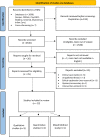What do we know about the psychosocial issues associated with cancer during pregnancy? A scoping review and gap analysis
- PMID: 36868601
- PMCID: PMC9990617
- DOI: 10.1136/bmjopen-2022-063283
What do we know about the psychosocial issues associated with cancer during pregnancy? A scoping review and gap analysis
Abstract
Objectives: There is a global increase in the number of women diagnosed with cancer during their pregnancy and a nascent evidence base to guide their supportive care. The purposes of this study were to (1) map research on the psychosocial issues affecting women and their partners on diagnosis and treatment for cancer during pregnancy; (2) determine available supportive care or educational interventions; and (3) identify knowledge gaps for future research and development.
Design: Scoping review.
Search strategy: Six databases were searched (Scopus, CINAHL, PsycINFO, Medline, Intermid, Maternal and Infant Health) to retrieve primary research (January 1995 to November 2021) investigating women and/or their partner's decision-making and their psychosocial outcomes during and after pregnancy.
Data extraction and synthesis: Sociodemographic, gestational and disease characteristics of participants and psychosocial issues identified were extracted. Leventhal's self-regulatory model of illness provided a framework for mapping study findings enabling evidence synthesis and gap analysis.
Results: Twelve studies were included, conducted in eight countries in six continents. Most women (70% of 217) were diagnosed with breast cancer during pregnancy. Reporting of sociodemographic, psychiatric, obstetric and oncological characteristics that are important in assessing psychosocial outcomes was inconsistent. None of the studies had a longitudinal design and no supportive care or educational interventions were identified. The gap analysis highlighted the lack of evidence about pathways to diagnosis, impact of late effects and how internal/social resources may affect outcomes.
Conclusions: Research has focused on women with gestational breast cancer. Little is known about those diagnosed with other cancers. We encourage future study designs to capture data on sociodemographic, obstetric, oncological and psychiatric characteristics and adopt a longitudinal approach to explore the longer term psychosocial impact on women and their families. Future research should include outcomes that are meaningful for women (and their partners) and draw on international collaboration to accelerate progress in this field.
Keywords: MENTAL HEALTH; OBSTETRICS; ONCOLOGY.
© Author(s) (or their employer(s)) 2023. Re-use permitted under CC BY-NC. No commercial re-use. See rights and permissions. Published by BMJ.
Conflict of interest statement
Competing interests: None declared.
Figures
References
-
- Office for National Statistics . Statistical bulletin: childbearing for women born in different years england and wales 2020. 2020.
-
- United Nations . New york, world population prospects 2019. 2019.
-
- OECD family database. 2019. Available: https://www.oecd.org/els/family/database.htm [Accessed 19 Jan 2021].
-
- Knight MB KT, Jayakody H, Shakespeare J, et al. Saving lives, improving mothers’ care; lessons learnt to inform maternity care from the UK and ireland confidential enquiires into maternal deaths and morbidity 2014-16. University of Oxford, 2018.
Publication types
MeSH terms
LinkOut - more resources
Full Text Sources
Medical
Miscellaneous


